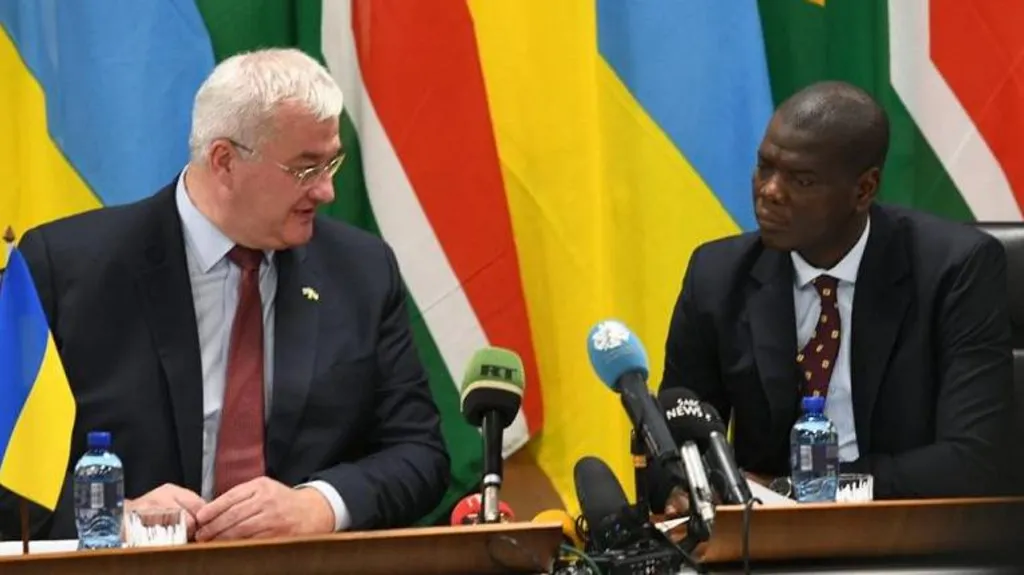South Africa’s Visa Agreement with Ukraine Sparks Political Division
3 min read
South Africa's Foreign Affairs Minister Ronald Lamola hosted his Ukrainian counterpart Andrii Sybiha on Monday

South Africa's Foreign Affairs Minister Ronald Lamola hosted his Ukrainian counterpart Andrii Sybiha on Monday
A contentious agreement to provide Ukrainian diplomats with visa-free access to South Africa has ignited significant backlash among the nation’s political factions. The announcement was made by Home Affairs Minister Leon Schreiber, a member of the opposition Democratic Alliance (DA), who referred to Ukraine as a “valued ally.”
However, this announcement was met with criticism from the presidency, which stated that Schreiber had acted without the formal authorization of President Cyril Ramaphosa. This incident highlights the ongoing tensions within the government regarding South Africa’s foreign relations, particularly its complex stance toward Russia amid the ongoing conflict in Ukraine.
Critics of the visa agreement argue that it undermines South Africa’s historical ties with Russia. Despite its official neutrality in the Ukraine conflict, the ruling African National Congress (ANC) has been at odds with the DA over how to navigate the delicate relationship with Moscow. The ANC has governed South Africa since the end of apartheid three decades ago but lost its parliamentary majority in the recent May elections, leading to a coalition with smaller parties.
President Ramaphosa further strained relations with the DA during the recent Brics summit in Kazan, where he referred to Russia as a “valued friend.” This remark drew sharp criticism from the DA, which has consistently condemned Russia’s invasion of Ukraine.
In a post on social media platform X, Schreiber declared, “I have signed an historic agreement granting visa-free access to our country for Ukrainian holders of diplomatic, official, and service passports – and vice versa.” He justified the decision by recalling Ukraine’s historical support for South Africa during its struggle against apartheid.
In contrast, Ramaphosa’s office quickly countered, asserting that the minister’s announcement was premature and lacked the necessary presidential approval. Spokesperson Vincent Magwenya questioned how an international agreement could be announced without proper authorization.
On the following Monday, International Relations Minister Ronald Lamola met with his Ukrainian counterpart, Andrii Sybiha, to discuss the agreement, stating that it is still pending finalization and official signing. “Once all the diplomatic processes have been concluded, the agreement will be signed, and we will announce it once those processes have been followed,” Lamola stated, emphasizing the need for proper protocols.
Opposition parties have also weighed in on the matter. Leigh-Ann Mathys, spokesperson for the Economic Freedom Fighters (EFF), condemned the visa agreement as a “betrayal” of South Africa’s solidarity with Russia. This sentiment reflects broader concerns among political factions about the implications of aligning more closely with Ukraine.
Additionally, the nascent opposition party led by former President Jacob Zuma, uMkhonto weSizwe (MK), has voiced its opposition to the agreement. Party spokesperson Nhlamulo Ndhlela suggested that the deal would facilitate an influx of “defeated right-wing Ukrainians” into South Africa, framing it as part of a strategy by the DA to support Western imperialist agendas.
This controversy underscores the growing divisions within South Africa’s political landscape regarding foreign policy and international alliances. As the ANC navigates its coalition with the DA and other parties, the challenge lies in balancing domestic political pressures with the complexities of international diplomacy.
The visa agreement’s future remains uncertain as political leaders continue to debate its implications. While Schreiber touts it as a historic step in diplomatic relations, the presidency’s stance and the responses from opposition parties reveal deep-seated concerns about the potential consequences for South Africa’s foreign relations.
In this polarized environment, the outcome of the visa deal could have far-reaching effects, not only for South Africa’s relationship with Ukraine and Russia but also for the internal dynamics of its coalition government. As the nation approaches the next election cycle, these discussions will likely become increasingly relevant in shaping public opinion and influencing political alignments.
Ultimately, the fate of the visa agreement may reflect broader themes of loyalty, geopolitical strategy, and the ongoing struggle for power within South Africa’s political landscape.